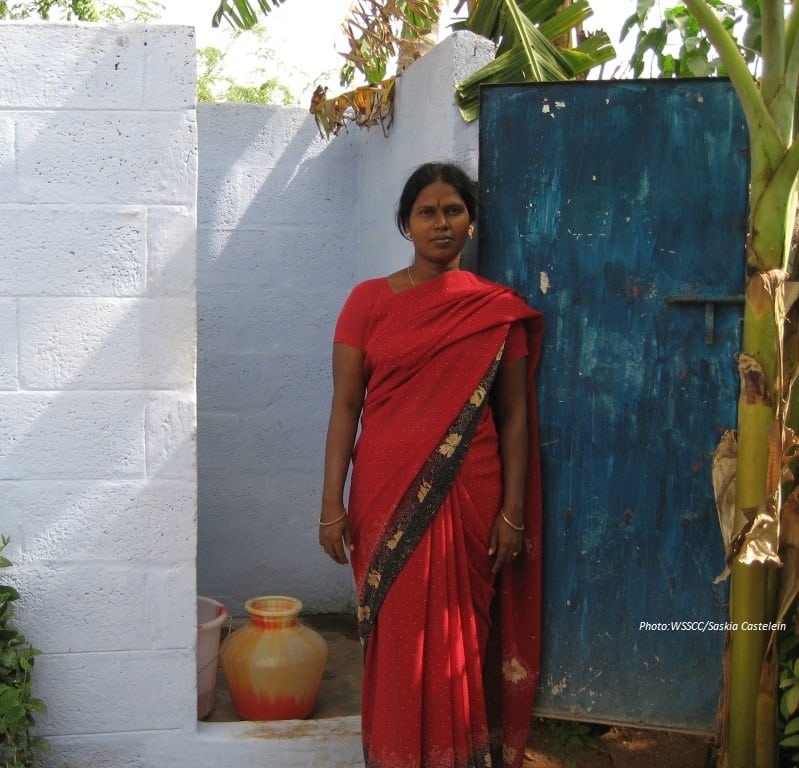“We have broken a taboo and quite powerfully too,“ declared Senegal’s UN Ambassador, Fode Seck, wrapping up an event where women (and men) from around the world eagerly packed into a UN conference room – sitting even on the windowsills and the floor – to discuss the impact on women and girls of inadequate menstrual hygiene, open defecation and other practices that are usually unmentionable in polite company.
Titled Unlocking multiple benefits for women and girls through sanitation and hygiene in the post-2015 era, the event took place on 13 March during the two-week session of the UN Commission on the Status of Women (CSW). The Permanent Missions of Senegal and Singapore co-hosted, with the support of the Water Supply and Sanitation Collaborative Council (WSSCC) and UN Women.
Singapore Ambassador Karen Tan kicked off the discussion by summing up the dire situation: 2 billion people globally lack adequate sanitation, and one billion practice open defecation, with particular challenges for women and girls, including greater risk of violence and sexual assault. There is much work to be done, she noted, in providing WASH facilities to women and girls, who “should not be ashamed of these very natural needs they have.”
Target 6.2 of the proposed Sustainable Development Goals, calling for access to sanitation and hygiene for all by 2030, includes a critical phrase: “paying special attention to the needs of women and girls”, Ambassador Tan pointed out, and she hoped this phrase would be safeguarded and ultimately implemented by all UN Member States. “I was happy to hear,” she said about the CSW, “people talking about provision of toilets as crucial to allow girls and adolescent girls to continue their education and find good employment.”
Senegal’s Minister of Water and Sanitation, Mansour Faye, highlighted the new policies his government had adopted to give women greater access to sanitation at home and in public spaces like schools, and to manage waste adequately. Information and communications needed to be an important part of the strategy if we are going to change the behaviour of women, he said.
Chris Williams, Executive Director of WSSCC, praised Senegal for taking a “whole of government approach” to what some would consider a gender issue, illustrating the convergence needed. Addressing sanitation and hygiene can be a strategic entry point to improving women’s standing in society and their access to education and work, he said.
Women in Senegal, like in other parts of Africa, are the de facto managers of water, sanitation and hygiene services in the household and the community, but “are absent in the decision-making process” for WASH programmes. This was one of the findings of a study of menstrual hygiene management in the Kedougou region of Senegal, presented by Dr. Rokhaya Cisse of the University of Dakar and her colleagues.
In Kedougou, 64 per cent of women and girls said there are no toilets in public places, including at work or in the market, noted Rockaya Aidara of WSSCC, and 96 per cent of economically active women said they do not regularly go to work during menstruation. As well, over 40% of girls said that they missed school for at least one day per month during their periods.
Turning to sanitation problems in India, Robert Dreibelbis of the University of Oklahoma said that a study he did in Orissa showed the psycho-social stresses caused on women by poor sanitation, especially open defecation. These stresses included peeping or spying by men and boys and the threat of rape of sexual assault. He noted that even women who had latrines at home practiced open defecation, because private latrines were often in disrepair.
Begona Lasabagaster of UN Women linked the sanitation and hygiene challenges that women faced to all the priority areas under the Beijing Platform of Action, and said that “we are talking about human rights — the right of women and girls to live a life of dignity, free from violence, the right to work, the right to reproductive health.”
A representative from Nicaragua spoke about their commitment to better policies for menstrual hygiene, and a delegate from Nepal said they have set a strategic goal to ensure water and sanitation for all by 2017, with work underway on making villages “open defecation free”. Toilets in every district have gender-friendly features, with separate toilets for girls in schools.
“It is hard to talk about women’s empowerment if day-to-day practical needs are ignored,” said moderator Archana Patkar of WSSCC, adding that it is exciting to see a movement towards integrating service delivery into the lofty goals under discussion at the UN.

